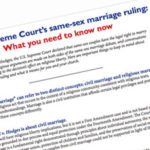HARTFORD, Conn. (ABP) — The Connecticut Supreme Court Oct. 10 made that state the latest in the union to offer full marriage rights to same-sex couples.
The state's justices ruled 4-3 that the equal-protection and due-process provisions of the Connecticut Constitution require marriage be extended to gay men and lesbians. It becomes the third state in the United States — after Massachusetts and California — to legalize same-sex marriage.
When the ruling takes effect Oct. 28, it will mainly change terminology, since Connecticut has allowed gay couples to enter into "civil unions" — with rights and responsibilities virtually identical to marriage — since 2005. When the state's legislators passed that bill and Gov. Jodi Rell (R) signed it, Connecticut became the first state to approve civil unions without being under judicial pressure to do so.
Civil unions not enough
But the latest decision said civil unions aren't enough. While not specifically enumerated in the state’s charter, Justice Richard Palmer said in the majority opinion, marriage "has long been deemed a basic civil right."
"We conclude that, in light of the history of pernicious discrimination faced by gay men and lesbians, and because the institution of marriage carries with it a status and significance that the newly created classification of civil unions does not embody, the segregation of heterosexual and homosexual couples into separate institutions constitutes a cognizable harm," Palmer wrote.
"Interpreting our state constitutional provisions in accordance with firmly established equal-protection principles leads inevitably to the conclusion that gay persons are entitled to marry the otherwise-qualified same-sex partner of their choice," he added. "To decide otherwise would require us to apply one set of constitutional principles to gay persons and another to all others."
While acknowledging that marriage has been traditionally viewed as between a man and woman, the court said history teaches that society's prevailing views and practices often mask unfairness and discrimination not recognized by those not directly harmed. They cited previous bans on interracial marriage, exclusion of women in occupations and official duties and relegating minorities to "separate but equal" institutions.
"Like these once-prevalent views, our conventional understanding of marriage must yield to a more contemporary appreciation of the rights entitled to constitutional protection," the decision said.
Sign up for our weekly edition and get all our headlines in your inbox on Thursdays
Dissenting opinions
In one of three separate dissenting opinions, however, Justice Peter Zarella said decisions on same-sex marriage should be left up to the democratic process rather than a judicial one.
"The ancient definition of marriage as the union of one man and one woman has its basis in biology, not bigotry," Zarella wrote. "If the state no longer has an interest in the regulation of procreation, then that is a decision for the legislature or the people of the state and not this court."
The majority said the state’s main rationale for denying marriage to same-sex couples was to preserve the institution of marriage exclusively for heterosexuals. That reason alone, they ruled, is insufficient to justify a ban on same-sex marriage.
The majority also said recognizing the right of gays to wed does not jeopardize religious freedom, because religious organizations will not be required to perform same-sex marriages.
"Because, however, marriage is a state-sanctioned and state-regulated institution, religious objections to same sex marriage cannot play a role in our determination of whether constitutional principles of equal protection mandate same-sex marriage," the court ruled.
Rell's office quickly released a statement saying that, while she disagreed with the ruling, she would enforce it.
"The Supreme Court has spoken," Rell said. "I do not believe their voice reflects the majority of the people of Connecticut. However, I am also firmly convinced that attempts to reverse this decision — either legislatively or by amending the state Constitution — will not meet with success. I will therefore abide by the ruling."
Predictably, gay-rights groups hailed the ruling while conservative religious groups pointed to it as another example of why they believe a federal constitutional amendment banning gay marriage is necessary.
However, the decision — unlike a comparable Massachusetts court ruling on gay marriage prior to the 2004 presidential election — may have little effect on the upcoming contest. Unlike in 2004, same-sex marriage bans are on the ballot in only a handful of states this year.
Additionally, recent polls suggest that issues such as the economy and the war in Iraq are far more important — even to conservative religious voters — than gay marriage or other divisive social issues in determining their voting decisions.
The ruling came about when a group of eight same-sex couples were rejected for marriage licenses by Connecticut officials in 2004. The case is Kerrigan v. Commissioner of Public Health, No. 17716.
Read more
Connecticut Supreme Court decision in Kerrigan v. Commissioner of Public Health















We seek to connect God’s story and God’s people around the world. To learn more about God’s story, click here.
Send comments and feedback to Eric Black, our editor. For comments to be published, please specify “letter to the editor.” Maximum length for publication is 300 words.